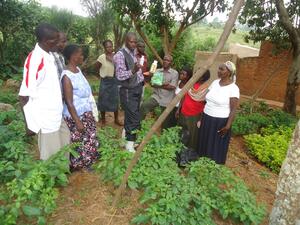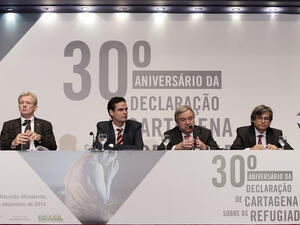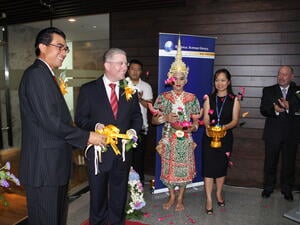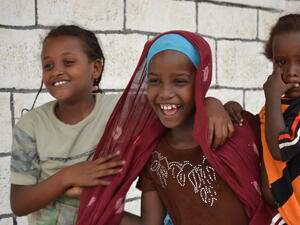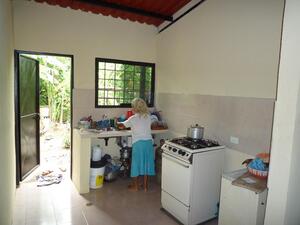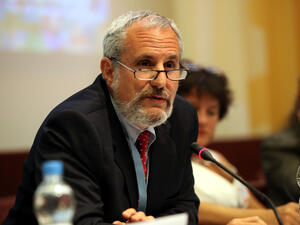Latin American countries adopt Plan of Action on refugee protection
Latin American countries adopt Plan of Action on refugee protection
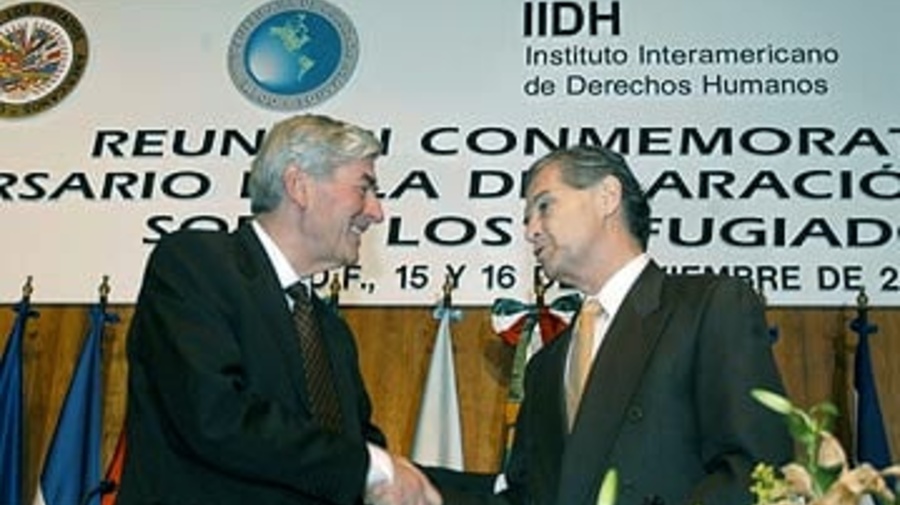
High Commissioner Ruud Lubbers with Mexican Foreign Minister Luis Ernesto Derbez marking the 20th anniversary of the Cartagena Declaration on Refugees in Mexico City.
MEXICO CITY, November 17 (UNHCR) - As Latin America's biggest metropolis, sprawling over a huge valley where the ancient Aztecs founded it, Mexico City provided an impressive stage for an event of historical proportions this week, when representatives from 18 Latin American countries signed a declaration that includes a series of actions to enhance the protection of refugees throughout the region.
On Tuesday, senior officials from all over Latin America, as well as experts and leaders from civil society, ended a two-day meeting to commemorate the 20th anniversary of the Cartagena Declaration on Refugees by reaffirming the relevance and endurance of its principles, and addressing current challenges in the region through an ambitious Plan of Action.
UN High Commissioner for Refugees Ruud Lubbers inaugurated the event, which was hosted by the Mexican government, co-organised by UNHCR and the Norwegian Refugee Council, and sponsored by the human rights organisations of the Inter-American System.
The Cartagena Declaration on Refugees of 1984 was a landmark document that offered an innovative approach to refugee protection and solutions, and broadened the refugee definition applied in Latin America. "Cartagena has contributed to ensuring that people whose need of protection is evident are protected and assisted. For this reason, 20 years after, it is fundamental to reiterate its validity and importance for all the countries of the region," said the Mexican Foreign Minister, Luis Ernesto Derbez, at the opening of the event.
In the 20 years since the Declaration's adoption, most Latin American states have either incorporated the Cartagena principles in their national legislation, or applied it in practice. Refugees from Latin America, most recently Colombia and Haiti, but also from Angola, Iraq, Liberia, Senegal, Sierra Leone and other countries, have found protection in Latin American countries thanks to the complementary application of the 1951 Convention and the Cartagena Declaration.
"In a world-wide context of restrictive asylum policies and erosion of protection principles, it is encouraging to see that countries in Latin America are committed to uphold high protection standards," said High Commissioner Lubbers. "UNHCR would like to continue working closely with governments and civil society in the region to strengthen this partnership of protection."
The Plan of Action adopted in Mexico City addresses the main challenges to refugee protection in Latin America, which include an increasing number of refugees in the main urban centres who are struggling to achieve self-sufficiency, as well as the development of asylum systems and building the protection capacity of governments and non-governmental organisations working with refugees.
The Plan will also address the humanitarian needs of people fleeing violence in Colombia. Humanitarian organisations estimate that up to 300,000 Colombians in need of protection have crossed into Ecuador, Panama, Costa Rica and Venezuela. The Plan includes a comprehensive programme to assess the needs of Colombians and of local host communities, especially in border areas of neighbouring countries, allowing for complementary humanitarian and development-oriented activities.
The Plan of Action proposes concrete actions that include working to achieve self-sufficiency and local integration in the cities (the "Cities of solidarity" programme), stimulating social and economic development in border areas to benefit refugees and the local population (the "Borders of solidarity" programme), and establishing a programme of resettlement in Latin America as a way to ease pressure on those countries receiving large numbers of refugees (the "Resettlement in solidarity" programme).
"I am convinced that the Declaration and the Plan of Action that will be adopted in this event will give a new impulse to the principles of Cartagena and will contribute to a better implementation of policies designed to achieve adequate and durable solutions to the new challenges we face," said Mexican Foreign Minister Derbez.
By William Spindler in Mexico City, Mexico



